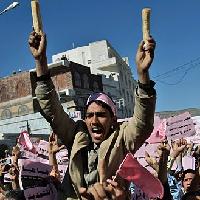
Lethal gas used against mass movement
The last week in Yemen has seen the most brutal violence – snipers, kidnapping and lethal gas – used against peaceful mass demonstrations. Yet, the attacks have motivated new layers to join the mass movement. More generals have left the president’s party and regions have declared liberation from the regime.
On Tuesday night, 8 March, there was an attack on the university square in the capital, Sanaa, where hundreds of thousands were protesting. Special forces, dressed as vigilantes, snipers on the roofs of nearby buildings and republican guards shooting lethal gas, killed two and injured 100 people. The ugliest attacks so far took place on Saturday 12 March. More than 1,000 people were injured, one hundred of them with severe gunshot wounds. Three people were killed, one of them shot by a sniper in the head.
The response of the masses was extremely angry. The victim of the sniper was an unmarried 32-year-old university graduate. He was at his workplace in the square, uploading photos of previous attacks, when he was killed.
All over the country, 20 people have been killed in the last week – five in Aden, two in Mukalla (both children), six in Sanaa, two in Amran, two in Thamar, and two in Albaidah. The lethal gas used, VX, is a nerve gas originally developed to kill bugs, but later used by the CIA. The US authorities gave 5 tons to the Yemeni regime to “fight terrorism”. This is thought to be the gas used by Saddam Hussein against the Kurds in 1988.
Despite this brutal violence, the revolution has continued. The shaikh of biggest tribe in Yemen, Bakil, has declared the president has to leave, stating that there is no room for dialogue after what happened on Tuesday and Saturday. Two more generals, commanding troops at one of the gates to the university square, have declared their resignation from the president’s party and came to the square. They revealed secrets of the six civil wars in the north of the country. Both the sheikh and the generals have promised to protect the mass movement.
In the region of Al-Jwaf in north, on the border with Saudi Arabia, the regime has completely lost control. The protesters have taken over the governmental buildings and city councils. Soldiers have deserted their regiments, left their arms and dressed as civilians.
In Mareb, the governor and his followers came to “advise” the youth on the square to end their protest and go home, and wait for elections. While he was talking, his goons started beating and arresting youths, and then opened fire. 37 people were severely injured. The tribe of some of the people that were shot responded by setting on fire an oil pipe, transporting 100,000 barrels per day. This oil-rich region has never benefitted from the oil income. There are no roads, no infrastructure, no schools, and no hospitals. The revolution has fuelled the anger stemming from 15 years of oil exploitation. Oil ownership is divided between Austrian company, OMV, and the president.
The US has attempted to save the president, warning of a “Libyan development” if the official opposition does not negotiate with the regime. Washington fears the fall of their puppet president as a result of the violence last week.
Revolutions in the region have been faced with brutal violence from the regimes have been able to overthrow dictators. The fall of Saleh is within reach for the movement. For revolutionaries, however, it is important to go further. The regime is not one individual. In Egypt, up to five million people were “part of the regime” on different levels, the hands and tools of the old dictator. In Yemen, an estimated three million people are registered as party members of the regime. The revolution has to build its own alternative – democratic committees with elected representatives to a revolutionary constituent assembly. Committees in workplaces, universities, urban and rural communities are needed. Socialists advocate the nationalisation of oil and all natural resources. All wealth connected to the old regime should be confiscated. US and Saudi imperialism should be thrown out. Capitalism must be replaced with democratic socialism to achieve real change.


Be the first to comment